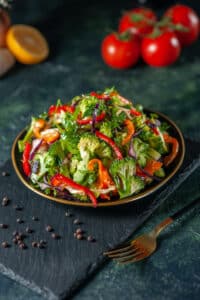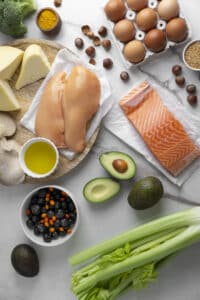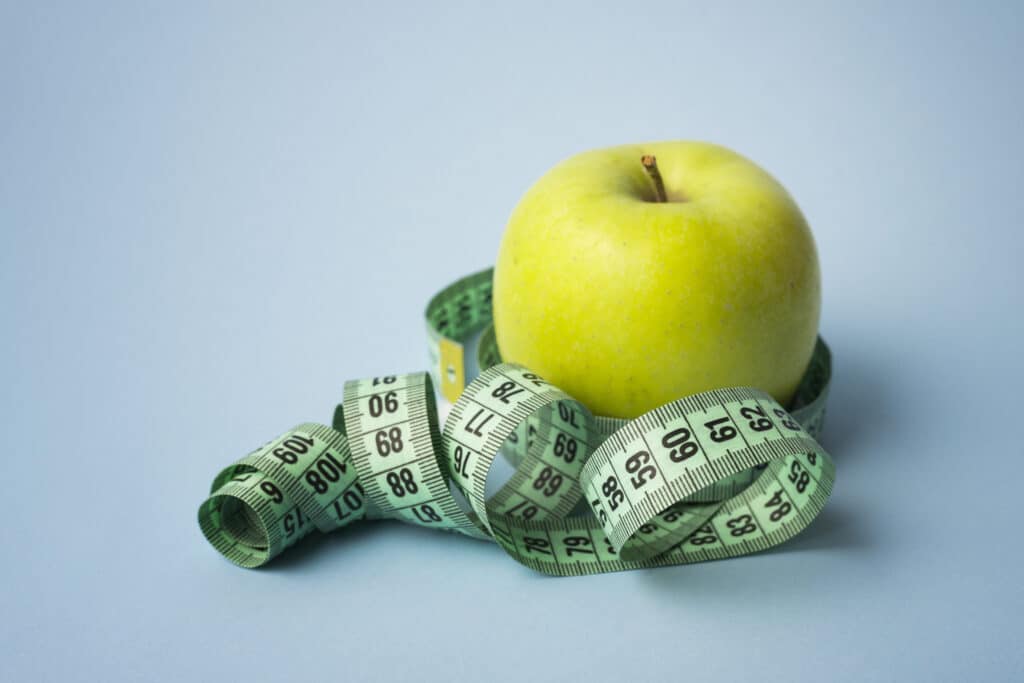With so much conflicting information on the internet, it can be confusing to know what you should avoid when trying to lose weight. Losing weight can be a challenging journey, and unfortunately, many people make mistakes that hinder their progress. In this article, we’ll explore some of the most common pitfalls to avoid when striving to shed those extra pounds. Let’s discuss some things that you could be doing that may not be aiding your weight loss.
1. Thinking all salads are healthy
Salad may have become synonymous with healthy eating and weight loss, but fancy it up in the wrong way and you’ll kill your metabolism. Try to avoid salads topped with creamy dressings, heavy cheeses, croutons, tortilla strips, candied nuts, and craisins. These additions take an otherwise healthy, diet-friendly meal and squash your day’s efforts. When opting for salad, choose a salad with a vinegar-based dressing, and top with fresh fruits, vegetables, and lean proteins like chicken and shrimp to fill you up and keep your nutritional intake on track. Vinegar, with it’s acetic acid content, triggers genes into action by pumping out protein and breaking down fats.

2. Artificial sweeteners
While sweeteners don’t contain any calories, they do taste sweet. The brain knows this, and expects calories to come. In response, the brain releases dopamine (the brain’s reward and pleasure chemical) into your system in anticipation of the calories…that never come. This response causes cravings for carbs and sugar. Multiple studies show that those who consume sweeteners over sugars will typically gain weight. Good alternatives are coconut palm sugar, maple syrup, honey, agave nectar, date puree, or otherwise – real sugars are better than artificial ones. Yes, they have calories and yes, they should be used in moderation, but with real sugar, the body knows what to do and how to process it. While eating sugar won’t speed up your metabolism – it also won’t trigger additional cravings by trying to trick your brain like sweeteners do.
3. Not drinking enough water
Drinking water stimulates your body’s metabolism and energy expenditure, ultimately helping with weight management. The body needs water to burn fat. The average American adult drinks nearly five cups of water a day, according to the Centers for Disease Control and Prevention. The general recommendation from the NASEM is approximately 91 ounces (about 11 cups) of water each day for women and approximately 125 ounces (about 15 and a half cups) for men. About 80% of the recommended fluid intake comes from drinking water and beverages, while the other 20% comes from water-rich foods. Read our article that goes more in-depth on how drinking water aids weight loss here.

4. Relying solely on exercise and not changing your diet
Exercise is important for overall health and can aid in weight loss, but it’s not the only factor. Some people make the mistake of thinking they can out-exercise a bad diet. While exercise is beneficial, it’s essential to focus on both diet and exercise for optimal results. This article by the CDC goes over the health benefits of physical activity. which in hand with a healthy diet, will help with weight loss.

5. Choosing Low-fat or diet foods
Processed low-fat or “diet” foods are often considered healthy choices that can help you lose weight. However, they may have the opposite effect. Many of these products are packed with sugar to improve their taste. For instance, a 6-ounce container (170 grams) of low-fat flavored yogurt can contain 23.5 grams of sugar (over 4 teaspoons). The Centers for Disease Control and Prevention (CDC) recommends that a 2,000-calorie diet include less than 12 teaspoons of added sugar per day. Low-fat products can also make you feel hungrier, so you may end up eating more food than your body needs. Instead of low-fat or “diet” foods, try to choose a combination of nutritious, minimally processed foods. When possible, choose fruits and vegetables.
6. Not eating enough protein
Getting enough protein is crucial for weight loss. It has been shown to:
- Reduce appetite
- Maintain or increase metabolic rate
- Protect muscle mass during weight loss
- Increase feelings of fullness
Try to have protein in every meal. Foods like chicken, salmon, beans, and legumes are high in protein.

7. Eliminating all carbs from your diet
It’s essential to remember that not all carbohydrates are created equal, and some sources, like whole grains, fruits, and vegetables, provide valuable nutrients and health benefits. Instead of completely removing carbohydrates from your diet, focus on choosing high-quality, nutrient-dense sources and moderating your intake based on your individual needs and health goals. Consulting with a healthcare professional can help you create a balanced eating plan that meets your nutritional needs. At Apple A Day Virtual Clinic we meet with our clients one on one and discuss what diet will work best to achieve your weight loss goals. Learn more about our weight loss programs here.
In conclusion, avoiding these common mistakes can help you stay on track with your weight loss journey and achieve lasting results. By focusing on balanced nutrition, regular exercise, adequate hydration, and other healthy habits, you can reach your weight loss goals in a sustainable way. Remember that consistency and patience are key, and don’t be too hard on yourself if you slip up occasionally. Keep making progress one step at a time, and you’ll soon see the results you desire.
Sources: https://www.healthline.com/nutrition/weight-loss-mistakes#TOC_TITLE_HDR_15
https://www.cdc.gov/healthyweight/physical_activity/index.html#:~:text=When%20losing%20weight%2C%20more%20physical,occurs%20from%20decreasing%20caloric%20intake.

